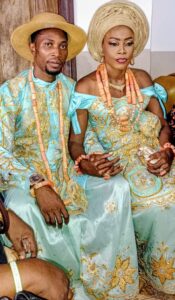

By Dada Ahmed.

Nigeria is a nation characterized by its rich cultural diversity, with over 250 ethnic groups and over 500 languages. While this diversity is a source of national pride, it has also been a point of contention, often leading to ethnic rivalries, distrust, and social fragmentation. Amidst this, inter-tribal marriage emerges as a beacon of hope—a natural bridge to unity, fostering social harmony and economic progress.
Breaking Ethnic Barriers
Inter-tribal marriages bring individuals and families from different ethnic backgrounds together, creating bonds that transcend tribal lines.
This was evident during the marriage between a couple of different states of origin in Nigeria.
Over a year ago, precisely on August 12, 2023, Pastor Emmanuel Salau and Miss Erica Erute tied the knot in a vibrant and colorful ceremony, marking the beginning of their journey into the proverbial “for better, for worse” lifelong union.
What made this union remarkable was not just the concept of marriage but its intertribal nature—a phenomenon uncommon among Nigeria’s multi-ethnic nationalities.
Pastor Emmanuel Salau is an Egbira indigene from Obehira in the Okengwe district of Okene Local Government Area, Kogi State. Erica Erute,on the other hand hails from the Urhobo ethnic group in Warri, Delta State.
The wedding was attended by many people from Kogi State, who expressed delighte over the warm reception they received from their in-laws in Delta State, despite differences in ethnic backgrounds and other divisive factors that threaten Nigeria’s unity.
As the debate over the merits and demerits of inter-tribal marriage continues among Nigeria’s various ethnic groups, the personal connections attendees formed during such unions have the potential to reduce stereotypes, foster mutual respect, and cultivate a shared sense of belonging.
The well-attended marriage between Pastor Emmanuel Salau and his wife beautifully showcased the blending of diverse cultures, reflecting the essence of a unified Nigerian identity.
Children born into such families often adopt a broader perspective, valuing inclusivity over division and in many cases, these families usually serve as microcosms of the broader Nigerian society, showcasing how unity can thrive amidst diversity.
Experience shows that in communities where inter-tribal marriages are common, tensions between ethnic groups often reduce to a greater degree with families with inter-tribal ties act as mediators, bridging gaps during conflicts and advocating for peaceful coexistence.
More so, it has been proved that
inter-tribal unions allow for the sharing of traditions, languages, cuisines, and values where cultural exchange enriches the lives of couples and their extended families, fostering greater appreciation for Nigeria’s diversity.
It has been argued, convincingly that when individuals from different tribes marry, they challenge societal prejudices and demonstrate the possibility of harmonious relationships across ethnic divides thus contributing to a more tolerant and inclusive society.
Inter-tribal marriages create a network of extended families that span multiple regions and help to create connections that encourage travel, dialogue, and collaboration between communities, breaking down regional isolation.
Economic experts and proponents of inter-tribal marriage agree that
families formed through inter-tribal marriages often have connections in multiple regions, creating opportunities for trade, investments, and collaborations, giving birth to economic interaction that fosters state integration and development.
Those on the side of
inter-tribal unions are of the opinion that these class of unions often combine individuals with different educational and professional backgrounds, contributing to a diverse and dynamic workforce to drive innovation and entrepreneurship.
Enhancing social capital
Inter-tribal marriages build social capital by creating extensive networks of trust and cooperation. These networks are valuable for community development projects, business ventures, and even policymaking.
Despite its benefits, inter-tribal marriage in Nigeria faces challenges such as cultural resistance, family opposition, and societal prejudice. However, these hurdles can be overcome through education and awareness by intensify effort in teaching the younger generation about the benefits of diversity and inclusivity.
Moreso, promoting inter-tribal interactions through national youth programmes, such as the National Youth Service Corps (NYSC), couples in such marriage will find peace and harmony. This is in addition to using media advocacy through
films, music, and literature to highlight the success stories of inter-tribal marriages.
In all, it is correct to say that inter-tribal marriage holds immense potential for Nigeria’s unity, social cohesion, and economic progress.Succh union is a reminder that diversity, when embraced, can be a powerful tool for nation-building. As Nigerians, fostering inter-tribal relationships is not just a personal choice, those involved in it believe that it is a patriotic act that contributes to the dream of a united and prosperous Nigeria.
In other words, by encouraging and celebrating inter-tribal marriages, Nigerians can build a society that embraces its differences, transforming cultural diversity into a powerful source of strength and progress for the nation.
Ahmed publishes The Reporters.

